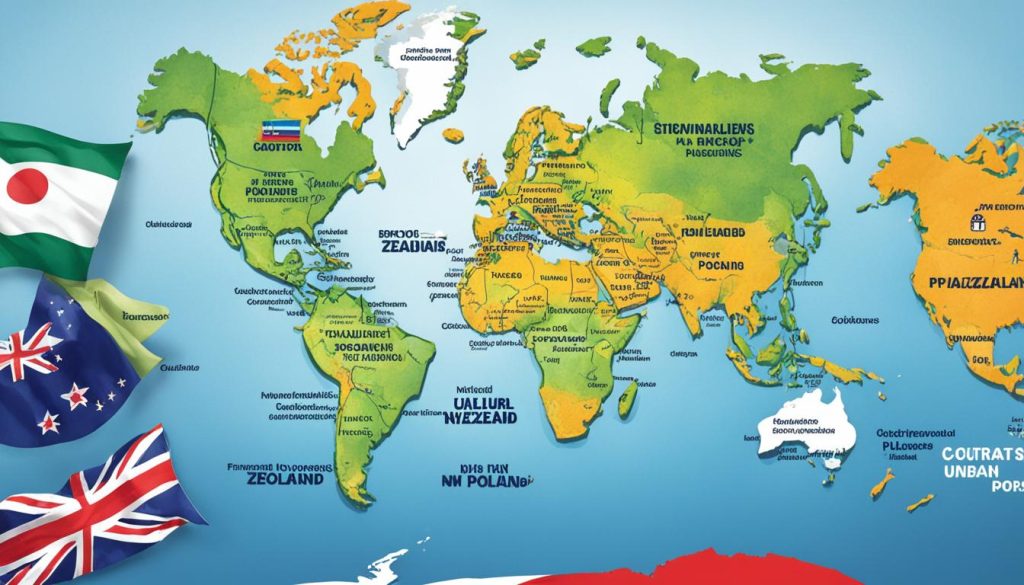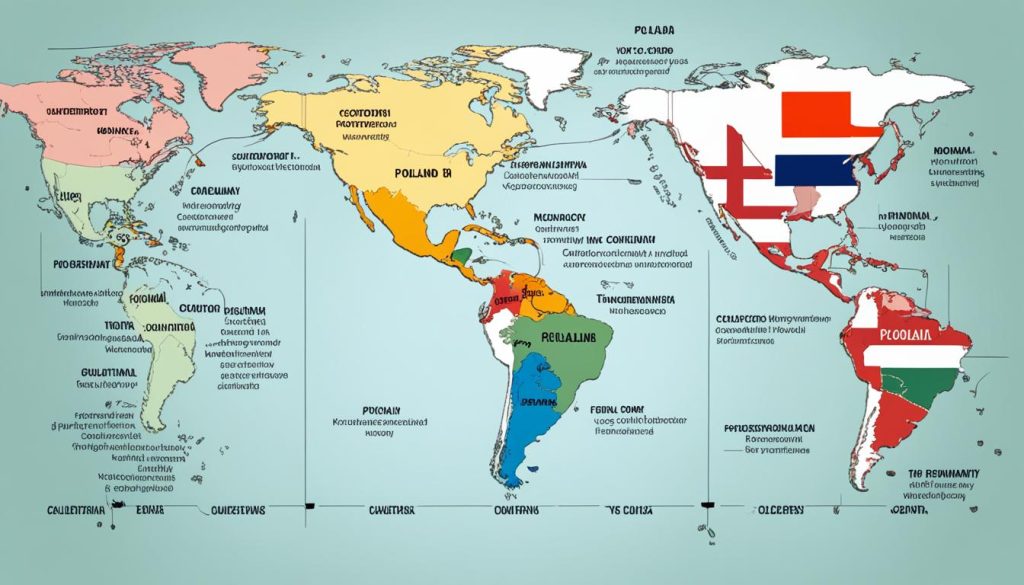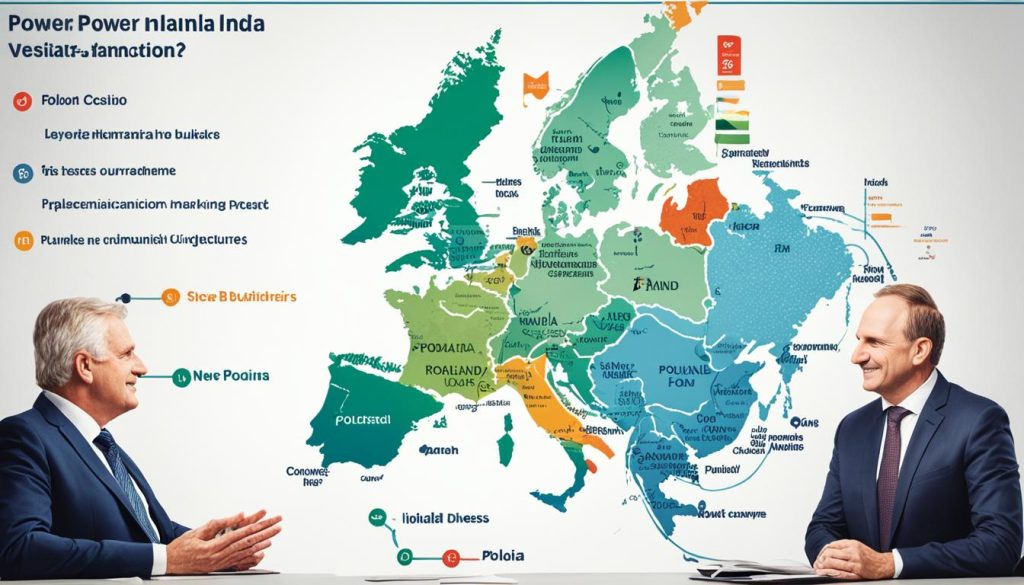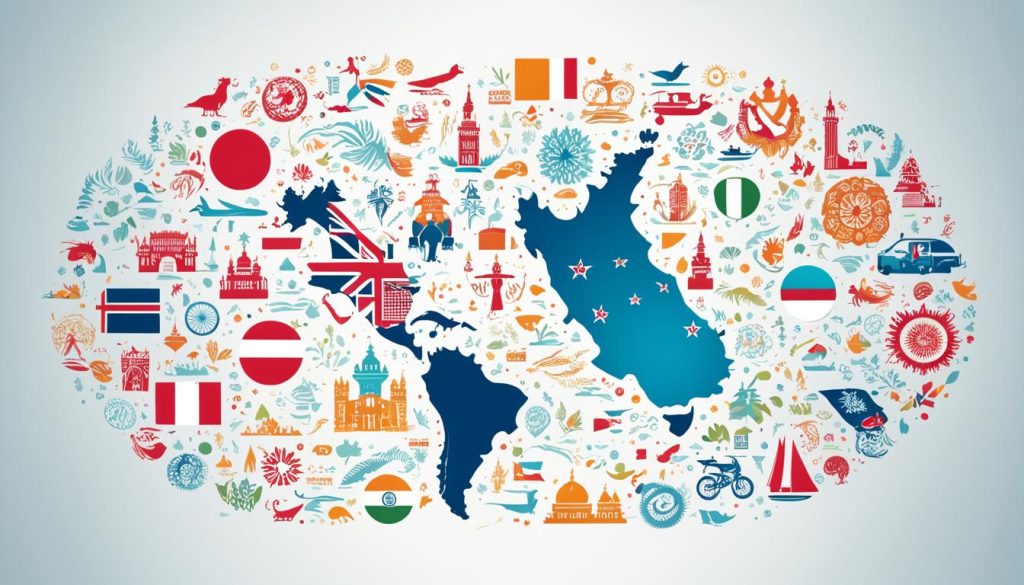In today’s global market, knowing about global business practices and cultural nuances is crucial for success. Different regions have their own customs that affect business dealings. The culture of a country can make or break a partnership. This article looks at the mix of culture and business in New Zealand, India, and Poland.
New Zealand mixes Maori traditions with a direct business style. This means building strong relationships is key before any business deals. In India, a rich mix of traditions and a clear social structure guide how business is done. Poland’s history and modern economy create a unique approach to business. This comparison shows how knowing local traditions is essential for international management.
Understanding The Cultural Foundations of New Zealand, India, and Poland
In international business, knowing and honouring cultural differences shapes the global business environment. It also influences the outcome of cross-border projects. Firms entering new markets or managing varied teams need to understand the subtleties of cross-cultural communication. They must also follow the specific professional etiquette. In places like New Zealand, India, and Poland, cultural roots are deep. They play a key role in business. Recognising these cultural aspects is vital for strong international business ties.
The Role of Culture in Business Practices
Culture and business practices are closely linked, affecting corporate operations. Leadership styles differ by location, shaped by each society’s cultural norms. This affects how people behave and interact. India, for instance, values a system where respect for authority is key. New Zealand prefers a team-based and cooperative approach. Culture, therefore, is crucial in leadership and designing company structures.
Cultural Differences in Professional Interactions
Grasping and adjusting to cultural differences is crucial in professional settings. Poland’s move towards gender egalitarianism shows their forward-thinking mindset. It impacts interactions between men and women at work. It also highlights the role of gender equality in business. Understanding these cultural details is crucial for clear communication. It helps build lasting, trusted business relationships internationally. As firms grow globally, being culturally agile is key to success.
To navigate the cultural complexities of New Zealand, India, and Poland takes sensitivity to local ways, beliefs, and business manners. Companies that excel see cultural knowledge not as a barrier. Instead, they view it as a pathway to meaningful and productive global engagement.
National Cultural Dimensions: A Comparative Study
Understanding cultural dimensions is key for businesses wanting a strong global workforce. The work of Geert Hofstede and the GLOBE project’s research offer a framework. This framework helps understand cultural dimensions that shape national cultures worldwide.
The findings of these studies simplify cultural identities into clear indices. They give businesses insights to use. Now, let’s see how these dimensions apply in different countries.
- Power Distance: Examines how societies handle inequalities and how subordinates perceive authority figures.
- Uncertainty Avoidance: Looks at a society’s tolerance for ambiguity and preference for established norms.
- Performance Orientation: Measures the degree of encouragement for societal members to innovate and strive for excellence.
- Assertiveness: Gauges the level of confrontation and directness that is socially acceptable.
- Future Orientation: Indicates the importance placed on future-oriented behaviours like planning and investing in the future.
- Humane Orientation: Reflects the value placed on being fair, altruistic, and caring within a society.
- Institutional Collectivism: Analyzes the degree to which collective action is encouraged and rewarded over individual goals.
- In-group Collectivism: Explores the strength of loyalty and cohesion within families and organisations.
- Gender Egalitarianism: Assesses the equality and balance of gender roles within the workplace.
These cultural dimensions impact business operations greatly. They affect decision-making, leadership, HR management, and communication. As companies go global, understanding cultural differences is essential.
By valuing these cultural dimensions, businesses can create a management style. This style respects their diverse workforce and appeals to various markets.
Power Distance: The Business Hierarchies of New Zealand, India, and Poland
The concept of power distance defines the organisational structure and leadership styles of a business. It affects how a company operates inside and with other firms. In our global world, understanding the business customs of countries like New Zealand, India, and Poland is key. Their views on power distance shape their business hierarchies.
In India, high power distance means ranks matter a lot in its business hierarchy. Senior managers and their teams are quite separate. This leads to a top-down way of leading. New Zealand, however, values equality more. This makes its businesses more open, promoting teamwork among all staff levels.
Poland finds itself between these approaches, blending old and new in its organisational structures and leadership styles. Since joining the European Union, it’s been moving towards less power distance. This change aims for a balance of respecting authority while working together.
-
India’s High Power Distance:
- Respect for hierarchical structures is deeply embedded.
- Titles and roles are highly valued.
- Leadership styles are typically autocratic or paternalistic.
-
New Zealand’s Lower Power Distance:
- Preference for flatter organisational structures promoting open communication.
- Leadership is collaborative, encouraging team input.
- Frequent use of cross-functional teams.
-
Poland’s Emerging Business Practices:
- Mixture of formal hierarchy and progressive ideals.
- Increasing adaptation of participative management approaches.
- Gradual decline in power distance is reshaping standard leadership styles.
Knowing about these dynamics is crucial for international business leaders. It matters whether you are dealing with partners in India, teams in New Zealand, or ventures in Poland. Understanding their unique power distance can help in creating smoother and more effective business interactions.
Adapting to Uncertainty: Business Approaches in India, New Zealand, and Poland
Uncertainty avoidance is key in business worldwide. In Poland, companies focus on risk management to avoid surprises. This isn’t about being stuck in their ways. It’s about creating a stable environment where businesses can thrive with confidence.
In India, companies are comfortable with uncertainty. They are remarkable at adjusting to new market trends and economic changes. Their ability to quickly adapt turns challenges into opportunities for innovation.
New Zealand companies use change management to stay innovative and adaptive. They use agile methods, responding quickly to changes rather than just reacting. This makes businesses there resilient, helping them grow even when the economy is unstable.
- Poland’s structured approach helps it manage uncertainty well.
- India’s flexibility allows it to thrive with lower uncertainty avoidance.
- New Zealand’s innovative practices help it navigate through changes.
It’s vital for international businesses to grasp these different views on uncertainty. Adapting management processes to fit local cultures helps with successful international work. Understanding how each culture deals with uncertainty helps businesses be both resilient and flexible globally.
Performance Orientation and Its Influence on Business Strategies
In today’s world, performance orientation is key. It shows how much societies value success and being the best. Poland and New Zealand are great examples. They focus on business excellence. They create a culture that boosts innovation and skill in their workers. Their aim for high performance shapes how they set goals and use their resources. This helps them stay ahead in global markets.
Seeking performance involves more than just making profit. It’s about motivating staff, using reward systems, and always aiming to do better. Here are key ways performance orientation shapes business plans:
- Goal Setting: High-achieving cultures set goals that are big but clear. These goals match the company’s big picture.
- Employee Motivation: They find ways to make employees want to do their best. Good work leads to real rewards and praise.
- Innovation and Development: Investing in research means new ideas are not just welcome, they’re sought after and put into practice.
A strong focus on performance changes how business works at all levels. It boosts the drive to start new things and perfectly finish big projects. Countries like Poland and New Zealand show how focusing on high quality can shape policies. These policies push for business excellence and lasting growth.
- Reward schemes that match how well one does.
- Chances for training and growing in your career.
- A culture of being the best in everything the company does.
In the end, performance orientation is fundamental for businesses aiming for the top. It’s about valuing high achievement. This mindset helps businesses in Poland and New Zealand lead in innovation. It keeps them sharp in a fast-changing global market.
Assertiveness in Business Communication Across Cultures
Understanding assertiveness is key in the complex world of business communication. How assertive you are can really shape your interactions and how well you negotiate. We’ll explore how different cultures view assertiveness and its impact on business.
In New Zealand, people often favour being modest and not too direct. This approach fosters teamwork and consensus. In contrast, in India, folks prefer being straightforward and clear. Knowing these differences is crucial for those working internationally and needing to adjust their way of talking.
- Assertiveness in Negotiation: Knowing when to project confidence and when to seek a collective agreement is a balancing act that hinges on cultural context.
- Cultural Adaptation in Business Communication: Tailoring your approach to align with these cultural expectations can be the difference between closing a deal or not.
- Conflict Resolution: Strategies for dispute mitigation vary significantly, with assertiveness levels shaping the methods employed.
- Maintaining Interpersonal Relations: Building trust and rapport often necessitates an understanding of unspoken cultural norms around assertiveness.
Developing a deep understanding of cultural expectations around assertiveness boosts communication and helps build professional bonds. It also helps businesses to move smoothly in international settings with confidence.
Using assertiveness wisely in cross-cultural talks not only improves existing relationships but also helps create new international partnerships. As businesses grow worldwide, adeptly communicating across cultures is key to success.
Future Orientation: A Strategic Perspective in Business Planning
Having a forward-looking view in business is key to building a lasting and creative company. Long-term planning helps set clear goals. These goals guide decisions towards achieving stability and growth over time. All businesses can benefit from thinking ahead in their planning.
In places like Poland where future planning may be less common, firms should balance short-term gains with long-term visions. In contrast, companies in highly future-oriented countries likely focus more on strategic planning. It’s vital for all businesses to evaluate their position and aim for a future-minded approach.
- Assessing cultural influence on strategic business planning
- Adapting business models to reflect both long-term and short-term objectives
- Integrating future orientation into the core values of a company
Chasing a solid business vision with good planning helps businesses face market changes and new technologies. The strategic planning process must take into account cultural differences. This ensures a strong position in the worldwide market.
- Establishing a clear business vision influenced by future orientation
- Conducting strategic planning with an emphasis on long-term growth
- Creating a balance between immediate and projected business needs
In the end, businesses looking to succeed in a changing world should embrace a forward-thinking culture. This approach sparks innovation and ensures lasting success.
Cultural Perspectives on Humane Orientation in Business Ethics
The idea of being humane in business is very important. It helps shape how much a company cares about being ethical and socially aware. This influences how people inside the company and outside view its main values.
In places that value being humane, companies are expected to care about people and society, not just profits. This understanding is key when looking at corporate responsibility and ethics. It’s especially true in varied cultures like India, New Zealand, and Poland.
How companies act responsibly can be different in each place, based on their culture. In India, the concept of ‘Seva’ encourages companies to help the community. New Zealand’s business practices reflect ‘Kaitiakitanga’, showing a commitment to guardianship and sustainability. In Poland, businesses are encouraged to be compassionate and help those in need.
- Understanding the cultural nuances of humane orientation aids in fostering ethical business environments.
- Promoting corporate responsibility through socially conscious actions contributes to a positive brand reputation.
- Incorporating social consciousness in decision-making processes ensures equity and fair treatment.
Today, people value transparency and honesty in companies more than ever. This means being kind, fair, and altruistic is not just nice but essential for long-term success. Companies that embrace these values do well. They win the trust of customers and the commitment of their employees. This leads to a cycle of good social impacts and ethical business practices.
Institutional Collectivism’s Impact on Corporate Culture
In many countries, institutional collectivism shapes how companies operate. It’s about team spirit in places like India, New Zealand, and Poland. Here, a nation’s culture encourages team goals and working together efficiently.
This focus on cooperation strengthens how teams in companies work across the world.
Where institutional collectivism is valued, teamwork is key in companies. Individual efforts are part of larger team achievements. This ensures everyone works towards common goals.
- Encouraging synergy across departments for effective resource utilisation.
- Promoting a cohesive front that aligns with collective corporate aims.
- Providing opportunities for employees to invest in shared success stories.
In cultures with less emphasis on collectivism, there can be a gap between personal and company goals. This highlights the importance of understanding local teamwork values for global businesses. Adopting these values helps create a unified and successful working environment.
- Understanding the role of institutional collectivism in personnel motivation.
- Adapting leadership styles to foster an inclusive corporate community.
- Establishing policies that facilitate collective as opposed to individual rewards.
The subtle aspects of institutional collectivism impact how teams and personal achievements are managed. Recognising these differences is crucial for businesses aiming to align with local cultures. To succeed globally, companies must blend their values with those of the local culture of collectivism.
Fostering In-group Collectivism for Enhanced Organisational Loyalty
In the rapidly changing world of international business, focusing on in-group collectivism is key. It helps build team unity and creates a family-like loyalty in companies. Understanding how cultural values and organisational commitment connect can boost company unity and worker dedication.
- The importance of team cohesion cannot be overemphasized in cultures that value in-group collectivism. Cohesive teams drive progress, innovation, and business durability.
- In a work environment, familial loyalty highlights the importance of emotional and relational ties to an organisation. This strengthens organisational loyalty.
- Building organisational commitment comes from acknowledging and growing these collectivist values. It creates a workplace where trust and a sense of belonging are crucial.
Businesses rooted in collectivist cultures can use these practices to enhance their identity and internal connections. At its core, promoting in-group collectivism shapes both team relationships and organisational policies.
It is vital for business leaders and HR strategists to embrace and apply these ideas for a united and committed workforce. Introducing team-building activities that highlight family values or celebrating shared success can integrate collectivist values into company policies. This approach is essential for global businesses.
- Assessing the current levels of in-group collectivism helps create strategies for better organisational loyalty.
- Offering cultural engagement activities that strengthen team familial bonds boosts loyalty to the organisation.
- Regularly reviewing and adjusting management strategies keeps the spirit of teamwork alive. This keeps pace with changing workforce needs.
Understanding the cultural foundations like in-group collectivism can give businesses a big advantage. It shows the company’s devotion to embracing diversity and improving its organisational culture through such meaningful practices.
Striving Towards Gender Egalitarianism in Business Environments
Around the world, bringing gender equality into the workplace is becoming crucial. It helps make workplaces diverse and fair for everyone. Countries like Poland are setting examples by helping women reach top jobs. This shows the world the huge benefits of making sure men and women are equal at work.
In places like India and New Zealand, the situation is different. Each country faces its own challenges in making their workplaces equal. India is working on cultural changes to close the gender gap at work. New Zealand, known for being forward-thinking, is still improving its approach to diversity and equality.
- Advocacy for equal opportunities ensures businesses remain competitive and mirror societal progressions.
- Gender egalitarianism underpins ethical business practices and engenders a robust, inclusionary work environment.
- Cultivating workplace diversity is not just morally imperative but commercially advantageous as well.
- Empowering women to pursue and secure leadership roles is essential to a holistic and prosperous organisational culture.
It’s very important to focus on gender equality in business today. By making sure all genders have the same chances and by supporting women in leadership, companies build a better work culture. The changes in India, New Zealand, and Poland show how important it is to include everyone, for both social and business gains.
Global Business Management: Navigating Cultural Sensitivities
In the world of international business, global management needs a deep understanding of cultural differences. This is key when working across the various cultures found in India, New Zealand, and Poland. Being skilled in cultural awareness is vital to succeed in each unique market.
Companies focused on global workforce management find it essential to adapt their strategies. They tailor these to meet different cultural views on leadership and how to communicate. Considering local customs, managing time, and effective negotiation are crucial for smooth international operations.
- Grasping the complexities of international business operations requires actively learning and respecting local practices.
- Leaders going abroad for work must learn about cultural subtleties to prevent misunderstandings.
- HR practices and training programmes need to promote sensitivity towards a diverse workforce.
With this insight, leaders can make choices that show cultural intelligence. This helps create a space where a global team can prosper. It not only boosts how the business runs but also strengthens its global standing.
Business Time Management: Varying Cultural Conceptualisations
In our global village, knowing how different cultures handle time management and punctuality is key. This is especially true for international business meetings. Different countries have unique ways of managing time. This greatly impacts how international projects are planned and carried out.
-
Scheduling in New Zealand is very strict with time, showing the organised way of Western business.
-
In India, the view of time tends to be more flexible. This affects meeting times and deadlines in businesses.
-
When working across cultures, being adaptable in scheduling is vital. It helps things run smoothly and encourages teamwork.
For companies around the world, understanding these time management differences is crucial. It’s not just about being culturally aware but also about business strategy. Here, we discuss what these differences mean for businesses in practice.
-
New Zealand companies expect tight scheduling. They require solid time management from everyone.
-
Working with Indian firms means adapting to a looser sense of time. However, it’s important to still honour agreed timings.
-
Being adept at handling these cultural time differences is crucial. It boosts productivity in international business meetings and helps maintain good global relations.
Management Functions: Integrating Cultural Differences
Effective management needs a deep understanding of cultural differences worldwide. These differences are crucial in the key areas of management like planning, organising, leading, and controlling. By incorporating cross-cultural integration, managers can improve their skills and create strong business strategies with cultural insights.
Planning and Organising Across Cultures
The planning process has to be flexible in a cross-cultural setting. It must consider different views on time and priorities. Global companies need to understand local customs and methods to plan and carry out their strategies effectively.
- Analysing cultural attitudes towards long-term vs short-term goals to align organisational objectives.
- Incorporating a global perspective in resource allocation, recognising the importance of cultural compatibility.
- Employing culturally-sensitive project management techniques to lead teams with diverse backgrounds.
Leadership and Control in a Multicultural Context
Leadership methods greatly depend on the cultural backgrounds of the workforce. Leaders have to show cultural empathy to lead a diverse team well. Control systems need to be adaptable to different cultural views on independence and responsibility.
- Developing leadership strategies that respect cultural idiosyncrasies while reinforcing the company’s core values.
- Implementing control measures that allow for cultural variability yet maintain organisational standards and compliance.
- Nurturing a communication climate that treasures diversity as a source of innovation and team cohesion.
Merging management practices with different cultures is challenging but rewarding. It opens doors for global businesses to grow by respecting cultural norms and succeeding in the international market.
Utilising the Doughnut Model for Sustainable Business Practices
The Doughnut Model stands out as a modern guide to sustainable business practices. It balances a social foundation, ensuring no one falls behind, with an ecological ceiling our planet can sustain. The beauty of the Doughnut Model is how it merges the well-being of people with protecting the earth’s limits.
In countries like India, New Zealand, and Poland, using the Doughnut Model means carefully checking economic actions. It makes sure important social needs are met without harming the environment. Companies in these places are now looking at their work through this model. They identify where society needs more support and where the environment is being harmed too much. This approach helps companies see how they can help create a fair and lasting future.
- The model pushes for better ways to manage supply chains to cut down on carbon emissions within nature’s limits.
- It motivates businesses to come up with new, lasting solutions. These should meet people’s needs without harming the planet.
- It also leads to talks between companies and all involved. This helps everyone understand how important it is to look after the environment and society.
This model is at the heart of modern business ideals. It shows companies can thrive within the planet’s ecological limits while being fair. As nations aim for economic growth, the Doughnut Model is proof that business can be done in a way that cares for our world and its people.
Conclusion
The global market is a complex field. It’s filled with different cultures like those in New Zealand, India, and Poland. Each presents unique challenges and chances for business leaders. This article explores how culture influences international business. It shows why understanding these differences is key for success.
Knowing how to blend in with these cultures gives companies an edge. Firms that adjust well to foreign values and practices succeed more. This tells us cultural intelligence is not just a concept, but a necessary skill for global business.
Understanding various cultural frameworks is crucial. It helps businesses navigate through the diverse world cultures. Valuing the cultures of New Zealand, India, and Poland boosts a company’s global operations. As companies aim for global growth, recognizing cultural differences lights the way. It leads to successful and respectful international expansion.
















